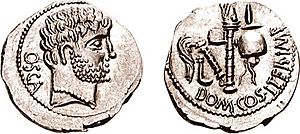Gnaeus Domitius Calvinus facts for kids
| Osca | |
|---|---|
 |
|
| OSCA behind, head of Hercules right, wearing necklace | DOM. COS. ITER. IMP, simpulum, aspergillum, axe, and apex |
| AR denarius; 3,78 g. Circa 39–38 BC | |
Gnaeus Domitius Calvinus was an important leader in Ancient Rome. He was a skilled general, a senator (a member of the Roman government), and even a consul (one of the highest elected officials) twice! He was a very loyal supporter of famous Roman figures like Julius Caesar and later, Augustus (who was also known as Octavianus).
Contents
Who Was Gnaeus Domitius Calvinus?
Gnaeus Domitius Calvinus came from an important Roman family. He became a consul in 53 BC, which was a very high position, even though there were some issues with his election.
Early Career and Civil War
He strongly supported Julius Caesar during the Roman Civil War against Pompey. During a military campaign in Greece, Caesar sent Domitius with two groups of soldiers (called legions) to stop another general, Metellus Scipio, who was bringing troops to Pompey.
At the important Battle of Pharsalus, Domitius Calvinus led the center of Caesar's army. After this battle, he became the governor of Asia, a Roman province. He tried to stop Pharnaces, the king of Bosphorus, who was invading the province of Pontus. Pharnaces took advantage of the Roman civil war to attack. However, Domitius Calvinus suffered a big defeat at the Battle of Nicopolis in Armenia.
Julius Caesar himself quickly stepped in and ended the conflict. Pharnaces' army was completely defeated at Battle of Zela in 47 BC. Even though Domitius Calvinus lost a battle, he remained a trusted friend of Caesar.
Supporting Octavianus
We don't know much about what Domitius Calvinus did right after Caesar was killed. But in 43 BC, he became a strong supporter of Octavianus (who later became Emperor Augustus). He took part in the civil war against Brutus and Cassius.
During the Philippi campaign in 42 BC, Domitius Calvinus was supposed to bring more soldiers from Italy to Greece for Mark Antony and Octavianus' army. However, his fleet (a group of ships) was destroyed by the enemy in the Ionian Sea. He lost two legions of soldiers in this defeat.
Despite this loss, he was honored with a second consulship in 40 BC. Octavianus then sent him to be the governor of Hispania (modern-day Spain), where he stayed for three years, from 39 BC to 36 BC.
Later Life and Achievements
His military actions in Spain were successful. His soldiers even called him imperator (a title for a victorious general). When he returned to Rome, he was given a triumph, which was a huge parade to celebrate his victories. He also rebuilt the Regia, an important building in the Roman Forum.
We don't have many details about his later political activities. However, an old inscription shows that he was still alive in 20 BC. He was also a member of the important Arval Brethren priesthood. This group of priests was usually only for members of the emperor's family and his most important supporters.
Even though Domitius Calvinus didn't always show special skills in politics or war (he had some election issues and lost two major battles), he kept an important role in Roman politics. This was probably because he was one of the few Roman nobles who supported Caesar and Octavianus from the very beginning.
His Family
Gnaeus Domitius Calvinus had a daughter named Domitia Calvina. She married a man named Lucius Calpurnius Bibulus.
See also
 In Spanish: Cneo Domicio Calvino para niños
In Spanish: Cneo Domicio Calvino para niños
- List of Roman consuls
 | John T. Biggers |
 | Thomas Blackshear |
 | Mark Bradford |
 | Beverly Buchanan |

